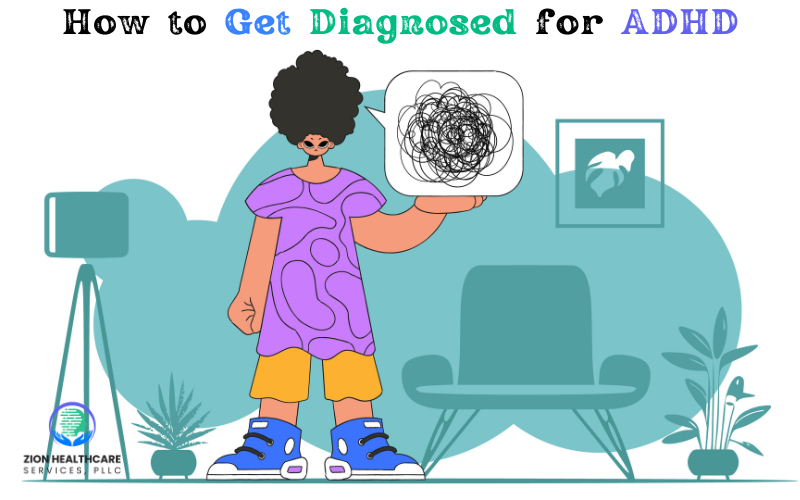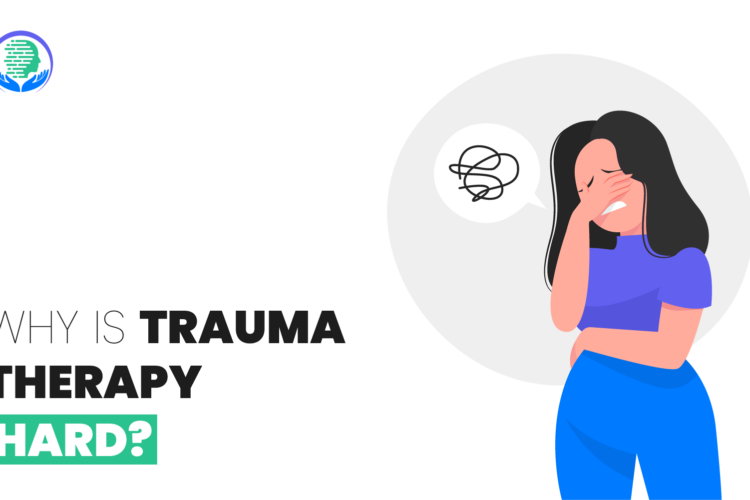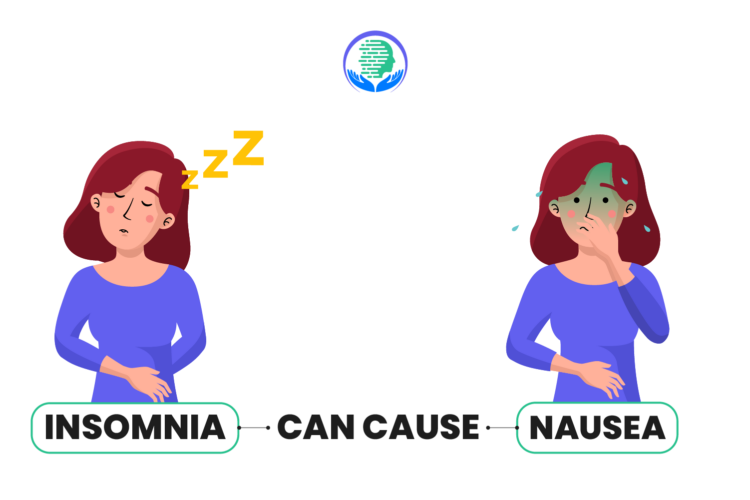
How to get diagnosed for ADHD? Without the right help and support, having ADHD can feel like constantly climbing a hill.
Research shows over 366 million adults around the world struggle with symptoms of ADHD. However, studies estimate less than 20% of adults with ADHD ever get an official diagnosis and treatment for their disorder.
Similarly, in ADHD, it can be challenging to focus or remember things. So, getting a diagnosis is important because it leads to treatment.
You can visit Zion Healthcare Services to receive guidance from a mental health professional.
ADHD Symptoms
Some common ADHD symptoms are:
- Difficulty paying attention/getting distracted
- Trouble following instructions
- Disorganization and poor time management
- Forgetting daily activities
- Excessive talking or noisiness
- Fidgeting and restlessness
- Avoiding tasks requiring mental effort
- Mood swings
- Interrupting others
To get the best support and help, you may contact us!
Nursing Diagnosis Of ADHD
How to get diagnosed for ADHD? Here are some potential nursing diagnoses for a patient with ADHD:
- The inability to focus on tasks for an appropriate length of time relates to a disturbed attention span.
- Being easily distracted by external stimuli relates to a disturbed sensory perception.
- Impaired Social Interactions related to difficulties taking turns in conversations and interrupting others.
- l-theanine for ADHD adults can help reduce symptoms of stress, anxiety, and restlessness.
- Melatonin is an occurring hormone that helps regulate sleep-wake cycles. Melatonin for hyperactivity and restlessness can cause people difficulty falling asleep.
- Risk for Injury related to impulsivity, lack of attention to safety risks, and tendency.
- Deficient Knowledge related to a lack of understanding of ADHD. Also, there is little knowledge about its impact and appropriate treatment/coping strategies.
- Noncompliance related to challenges following the treatment plan. It is due to forgetfulness and lack of organization.
- Deficient diversional activity related to avoidance of boring tasks requiring sustained concentration.
- Disturbed Sleep Patterns related to insomnia and restless sleep. These cause hyperactivity and an overactive mind.
- Behaviors affecting peer relationships and social skills development related to social isolation.
ADHD and Grief
Here are a few resemblances between the ADHD and grief;
| ADHD | Grief |
| Neurodevelopmental disorder is characterized by persistent patterns of inattention, hyperactivity, and impulsivity. | Emotional response to loss is typically associated with the death of a loved one, but can also occur due to other significant life changes. |
| Genetic factors, brain structure, and function abnormalities, and environmental factors. | Loss or significant life change, such as death, divorce, or major transitions. |
| Usually diagnosed in childhood, but symptoms may persist into adulthood. | Triggered by a specific loss or life event. |
| Chronic conditions lasting for an extended period, often lifelong. | Grief tends to be time-limited, but the duration varies for each individual. |
| Inattention, hyperactivity, impulsivity, difficulty organizing tasks, forgetfulness, fidgeting, etc. | Emotional distress, sadness, changes in appetite, and sleep disturbances |
Neurofeedback Therapy ADHD
Neurofeedback therapy is a type of biofeedback training. It uses real-time EEG brain wave data displays to teach patients. It explains how to modulate their brain activity.
During sessions, EEG sensors are placed non-invasively on the scalp. Rewards produce less impulsive, hyperactive brain wave patterns in patients.
ADHD avoidance is a situation where adults with ADHD may struggle with avoidance. These behaviors cause them to procrastinate important tasks.
Through many conditioning sessions over time, patients can have more conscious control over the brain parts.
Neurofeedback may help reduce ADHD symptoms by normalizing dysfunctional brain wave activity.
While searching for ADHD testing near me, choose the best option.
ADHD And Low Self Esteem
Low self-esteem is a common issue for individuals with ADHD due to challenges with focus, emotions, and time management.
The frustrations of not meeting expectations despite effort struggles with attention and forgetfulness. They feel like personal defects. Naltrexone for ADHD is a medication used to treat alcohol and opioid addiction. It has shown the potential to help reduce ADHD symptoms in some adults.
Calming Activities for ADHD Adults
If you think you may have ADHD as an adult, it’s smart to see a doctor who knows about ADHD in grown-ups. Some doctors who can help are:
- Your regular family doctor may know about ADHD in adults or can send you to someone who does it as their special job.
- Psychologists understand behaviors and can test if your issues match ADHD.
- Psychiatrists: a medical therapist for ADHD can say if you have a mental problem like ADHD and give medicine if needed.
- Neuropsychologists with ADHD know how the brain works and can rule out other brain issues.
Calming Techniques
Here are some calming activities that can help adults with ADHD manage stress and focus:
-
Deep Breathing
Taking slow, deep breaths relaxes the nervous system. Try breathing in for 5 seconds and out for 7.
-
Yoga
Gentle stretches and yoga poses calm both body and mind.
-
Playing an Instrument
Learning to play a calm instrument like piano or guitar is relaxing.
-
Cooking
Measuring, mixing, and chopping food engages the mind and senses.
-
Nature Walks
Being outside in nature, hearing birds, and feeling the breeze reduces stress and anxiety.
ADHD Treatment Options- How to get diagnosed for ADHD
Medication
Stimulant medications like Adderall treat core ADHD symptoms by increasing focus and attention. Other options include non-stimulants.
Cognitive Behavioral Therapy (CBT)
CBT teaches skills and coping strategies to manage ADHD symptoms. Therapists help patients develop organization, time management, emotional regulation, and problem-solving abilities.
Life Coaching
ADHD coaches provide accountability, structure unhealthy routines, and empower patients to achieve goals. They help people put in place tactics to overcome executive dysfunction challenges.
Family Therapy
For children, family therapy supports the entire household in understanding ADHD. Parents learn positive discipline and how to set up an organized environment.
Brain Training Programs
Computerized programs aim to “exercise” the brain’s focus and attention capabilities. Some research shows they may supplement standard ADHD treatment.
The best approach usually involves a customized combination of medication management. A doctor can recommend the most suitable options.
Wrapping up
How to get diagnosed for ADHD? You can talk to your regular doctor or a mental health professional.
Explain what you struggle with, like paying attention or controlling emotions. The doctor will ask questions and have you fill out forms. This helps them understand your symptoms. Tests can see if you have ADHD. Then, the best treatment for you can begin, like medication or learning new strategies.
Lastly, speaking to a medical expert is the first step to getting a proper diagnosis and the right support. Thus, you may contact Zion Healthcare Services for the right support and guidance.
FAQs
What are the 3 main symptoms of ADHD?
The key symptoms of ADHD include;
- Inattention
- Hyperactivity
- Impulsivity.
What do I do if I think I have ADHD?
If you suspect you have ADHD, schedule an appointment with your doctor or a mental health professional to be evaluated.
Where can I get my son tested for ADHD?
Getting an accurate assessment from his doctor is the first step to determining if your son has ADHD. With a diagnosis, you can find the best ways to support him.
Request a referral, if needed, to a psychologist for proper testing and diagnosis.
What triggers adult ADHD?
Many daily activities and environments can trigger adult ADHD symptoms. For example, lack of structure, uncontrolled stimuli, and unplanned changes in routine.


